This video is available on Rumble, Bitchute, Odysee, Telegram, and X.
What we call civil-rights laws are actually anti-discrimination laws. You must not discriminate against blacks or women or homosexuals or old people or any other members of the always-expanding class of official victims. These absurd laws punish people for not doing something.
If your policy is “no Irish need apply,” it means there’s something you won’t do: hire Irish.
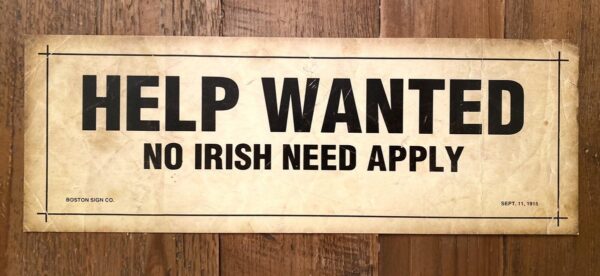
However, you are hurting no one. Anyone you don’t hire is no worse off than he was before — hurt feelings don’t count.
I bet you can’t think of many laws that punish you for not doing something. An example would be laws against child neglect. It’s a crime not to feed your children.
The government should have no more say in whom you hire than in whom you spend time with. I’m sure a lot of men would like to spend time with this lady, but she can pick and choose entirely as she likes.

She can spend time only with white men, if she wants, and it’s no one’s business but hers.
So, what’s special about refusing to hire people? Nothing. Nothing but selective moral frenzy.
We’re supposed to think that unless the law makes them do it, whites won’t hire blacks. That was never true, not even in the deep South, not even during slavery. Whites hired free blacks who could do the job — maybe for something less than the prevailing white wage — but they hired them. This 1902 book, Atlanta and Its Builders, gives a classic example from 1858.

“Some two hundred [white] mechanics and workingmen” wrote a letter to the city council complaining about “negro mechanics [who] can afford to underbid the regular resident citizen mechanics of your city, to their great injury.”
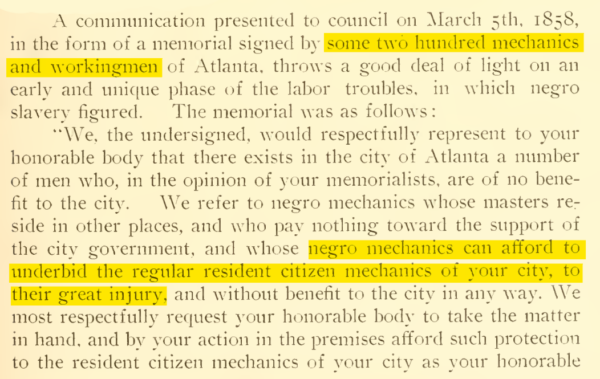
The whites wanted to make it illegal for blacks to practice trades because they didn’t like the competition. Whites hired black workmen.
In 1859, white Atlanta dentists complained to the council that “your honorable body tolerates a negro dentist (Roderick Badger) in our midst, and in justice to ourselves and the community, it ought to be abated.”
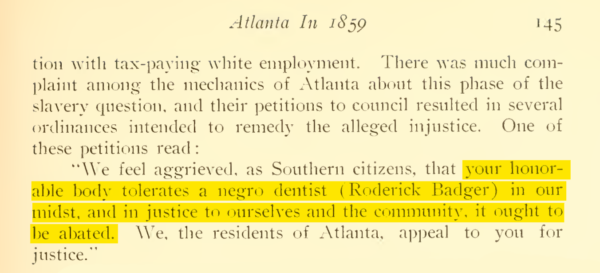
Too many people were letting a black man fix their teeth.
After emancipation, there were even more blacks competing for jobs. That was why many Jim Crow laws were passed: to ban blacks from skilled trades.
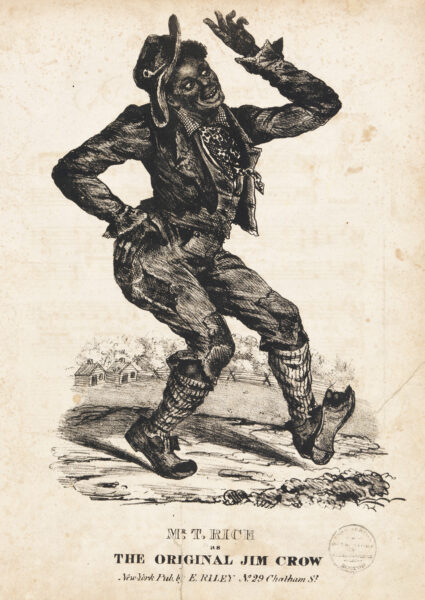
That was the only way to keep whites from hiring them.
You don’t have to like people to give them jobs. Marge Schott was the first woman to own and run a major-league baseball team.

She used to refer to some of her high-paid black players as her “million-dollar Negros” — except that she didn’t say “Negroes.” Maybe she didn’t like blacks, but this didn’t stop her from paying them a lot of money if they helped her team win. Is she known as a pioneering businesswoman? Of course not. She’d known as a racist.
In a free market, the profit motive is powerful. Not many businesses will deprive themselves of good workers for strictly racial reasons. And so what if they do? If customers or the other employees prefer an all-white staff, that’s nobody else’s business.

It’s the same for an all-black or all-Hispanic or Asian staff. How many white cooks do you see in a Chinese restaurant? When the government makes hiring decisions for you, you’re not running your own company.
Sex is like race.
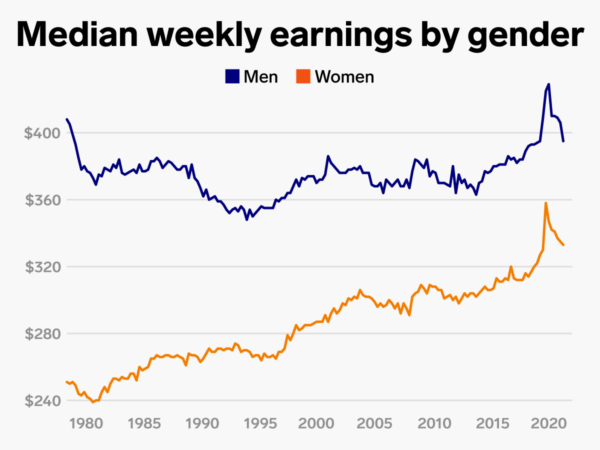
We hear over and over that women are paid less than men, even for the same work. If that were true, why haven’t we ever heard of a company firing all its men, replacing them with low-wage women, and making boom-time profits? Because men and women are different. Their interests and aptitudes are different. The market pays them what they’re worth.
You can still find articles like this one by a black woman: “Why Diversity Is Really Our Greatest Strength.”
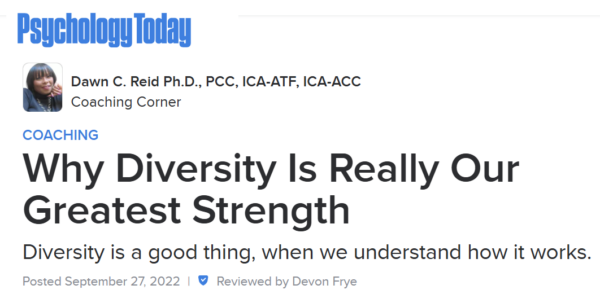
It’s all pure assertion and no facts. You can hire this woman as your personal life coach, by the way. Needless to say, diversity can be a strength — or a weakness, as in fact it is — only because groups are different, and it is 100-percent OK to prefer one group over another.
But those group preferences often give way to free-market forces. The famous 1896 Supreme Court case of Plessy v Ferguson was about whether it was legal for a railroad to have separate but equal cars for whites and blacks.
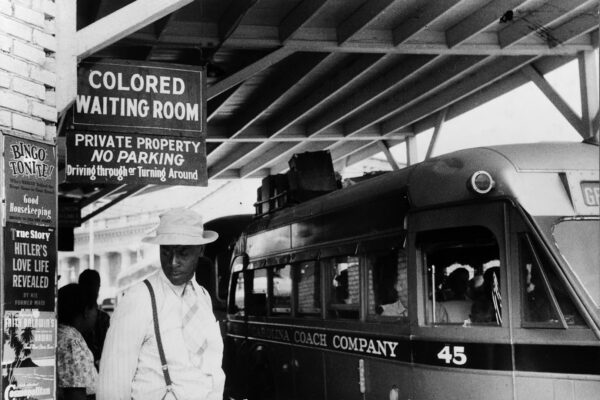
Few people know that segregation was required under Louisiana state law. The railroad company hated that law because it meant duplicating everything. It was a tremendous bother. The company hoped that octaroon Homer Plessy would win his case and the Supreme Court would get rid of “separate but equal.”

The Civil Rights Act of 1964 made race and sex discrimination illegal for employers. At that time, sex discrimination seemed so obvious and uncontroversial that Congressional opponents of the bill added the ban on sex discrimination, assuming that would sink the bill. They were shocked when the bill passed anyway: 290 to 130 in the House; 73 to 27 in the Senate.
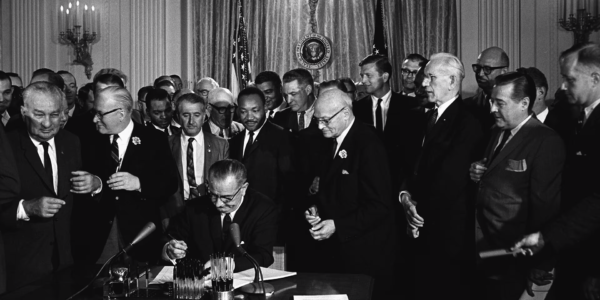
By the way, look how few blacks there are in this photo. Today, there would be more blacks than whites for a signing like this.
This law was a huge setback to freedom of association. And, as I pointed out in last week’s video, a law that was supposed to ensure equal treatment was very quickly used to require unequal treatment — preferential treatment for blacks and women — so as to get equal outcomes. Only this month did the US Supreme Court finally rule that whites — and men and heterosexuals — can claim discrimination under the law on a completely equal basis with everyone else.
So, there are excellent reasons to repeal the Civil Rights Act of 1964, and any other law that bans discrimination, whether of age, sex, handicap, erotic orientation, you name it. Anti-discrimination laws are a terrible burden on companies, and almost never help employees. Only bureaucrats and lawyers get fat on them. The best book I know on this subject is Forbidden Grounds, by Richard Epstein of University of Chicago and published by Harvard University Press in 1992.
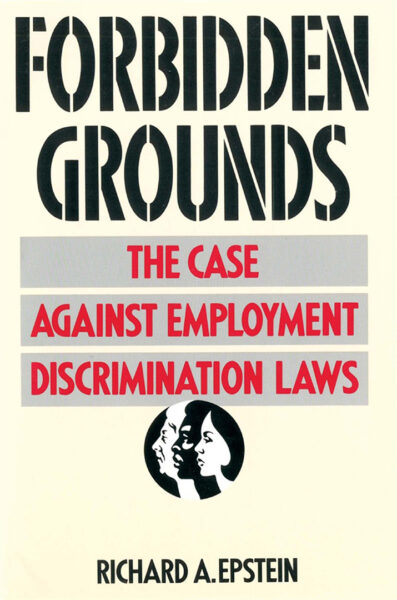
Take laws that forbid age discrimination. They make it illegal to set a mandatory retirement age. This book argues that companies should be free to set them and that most would. First, if you know you are leaving your job at a certain age, you can plan for it. Second, a company should not have to gather up all the intrusive, unpleasant details of someone’s creeping senility to justify firing him.

Just set an age limit. Third, if a worker ages out and then goes looking for another job, there is no suspicion that he left because he was going goofy. Finally, companies will discriminate against old job applicants because if they are no good and have to be fired, they can make pests of themselves by claiming illegal age discrimination. The government should stay out of this.
What would happen if the ’64 act were repealed? If United Airlines and Harvard were completely free to discriminate, who gets the shaft?

White men. Look at what companies and universities were doing when it was theoretically against the law to discriminate.

There is a tremendous head of steam built up behind the idea that we are the plague. Here: “How white supremacy became a global health problem.” Read all about it.

Do you think these people would make fair hiring decisions?

Credit Image: © Ron Adar/SOPA Images via ZUMA Wire
It’s true that there has been so much affirmative action and DEI, that people are numb to it, and things might not have got this bad without the ’64 law.
I’m beginning to sound like a broken record, but repeal would have to be part of an unrelenting campaign to publicize the facts about race differences in ability. Until whites understand that blacks or Hispanics, on average, can’t perform at the same level as whites, there is going to be an irresistible urge among some whites — whose own jobs aren’t at risk, of course — to discriminate against whites because they believe that’s how to right historical wrongs and let freedom ring.

Credit Image: © Vuk Valcic/SOPA Images via ZUMA Press Wire
I think they sincerely believe that.
Whites have been brainwashed for so long, it would take an intense campaign of truth-telling to set them straight. We’re headed that way for sure, but we’re not there yet.
The post Time to Abolish ‘Civil Rights’ Laws? appeared first on American Renaissance.
American Renaissance




 R1
R1
 T1
T1


